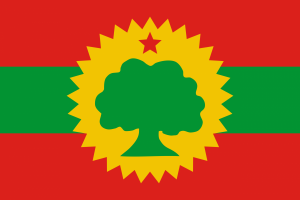Language/Borana-arsi-guji-oromo/Grammar/Questions
Hi Borana-Arsi-Guji Oromo learners! 😊
In this lesson, we will focus on questions in Borana-Arsi-Guji Oromo. Asking questions is an important part of communication, and we will explore the various ways to ask questions in our language. We'll also learn about the different question words and how to use them. 😎
With the completion of this lesson, consider investigating these related pages: Conditional Mood, How to Use Have & Negation.
Forming Yes/No Questions[edit | edit source]
As its name suggests, a yes-no question is a question that can be answered with a simple "yes" or "no". In Borana-Arsi-Guji Oromo, we form yes-no questions by using the negative particle "ama" at the beginning of the sentence. The word order of the sentence remains the same as a statement. For example, "Obsa is reading" would be "Obsa oollo". To turn this into a yes-no question, we add "ama" at the beginning: "Ama Obsa oollo" (Is Obsa reading?). The answer would be "Yes, Obsa is reading" or "No, Obsa is not reading". Here are a few more examples:
| Borana-Arsi-Guji Oromo | Pronunciation | English |
|---|---|---|
| Ama qalloo | A-ma qal-lo-o | Are you married? |
| Ama lafatti | A-ma la-fat-ti | Do you speak Borana-Arsi-Guji Oromo? |
| Ama harka | A-ma har-ka | Have you eaten? |
Forming Wh-Questions[edit | edit source]
Wh-questions are questions that begin with question words such as "what", "why", "when", "where", "who" and "how". In Borana-Arsi-Guji Oromo, we form wh-questions by starting the sentence with the appropriate question word. We use the same word order as a statement. The most common wh-questions are:
| Borana-Arsi-Guji Oromo | Pronunciation | English |
|---|---|---|
| Ani | A-ni | Who? |
| Adera | A-der-a | How? |
| Madda | Mad-da | When? |
| Gogaa | Go-gaa | Where? |
| Gaba | Ga-ba | What? (Things) |
| Gafaa | Ga-faa | What? (Activities) |
Here are some examples of wh-questions:
- Dialogue:
* Person 1: Ani gocha? (Who is singing?) * Person 2: Abdi gocha. (Abdi is singing.)
* Person 1: Adera gaarii? (How did you travel?) * Person 2: Waqqa saddeeti. (I came on foot.)
* Person 1: Madda hojjete? (When are you coming?) * Person 2: Adoolessa bira ga'e. (I will come on Monday.)
* Person 1: Gogaa tokkote? (Where were you born?) * Person 2: Yaaddessaa tokkote. (I was born in Yaaddessa.)
* Person 1: Gaba inni? (What is this?) * Person 2: Miira inni. (This is a tree.)
* Person 1: Gafaa hin dhaggeeffadhere? (What are you doing?) * Person 2: Adaama bira miiraa tokkotti dhaga'an. (I am cutting a tree in Adaama.)
Tag Questions[edit | edit source]
Tag questions are small questions that are added to the end of a statement, usually to ask for agreement or confirmation. In English, tag questions usually begin with "isn't it?" or "don't you?" In Borana-Arsi-Guji Oromo, we form tag questions by adding "ama" at the end of a yes-no question. Here are some examples:
- Dialogue:
* Person 1: Gochi Obsaa amma hinkaafate. (Obsa sings beautifully, doesn't he?) * Person 2: Yoo, hinkaafatee. (Yes, he does.)
* Person 1: Abdiin walitti dhufeera. (Abdi came early, didn't he?) * Person 2: Ama, walitti dhufeenya. (No, he didn't.)
Exercises[edit | edit source]
To improve your Borana-Arsi-Guji Oromo knowledge, try to form questions using the following sentence:
- Borana-Arsi-Guji Oromo: Duriin akkaataa yeroo dheeraaf gadhiifamanii, 'Salaamatu, akka sana argitan garaa garaa?' jedhu mana jira.
- English: One day, as I was walking down the street, I heard someone say, "Salaamatu, will you be traveling abroad soon?"
You can also use the Polyglot Club website to practice your language skills. Find native speakers and ask them any questions!
Sources[edit | edit source]
➡ If you have any questions, please ask them in the comments section below.
➡ Feel free to edit this wiki page if you think it can be improved. 😎

